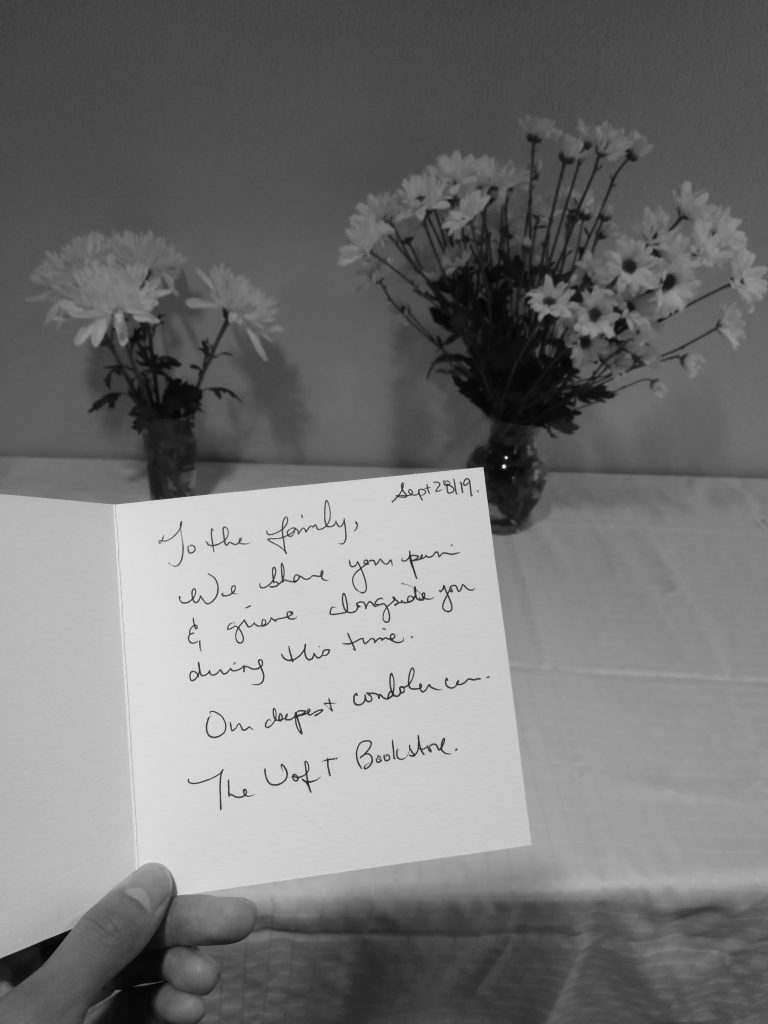Photo Credit: Aloysius Wong
We’re waving through the window of Simcoe Hall, President Gertler. Can you see us? Will you wave back?
Aloysius Wong, Photo Editor
Trigger warning: suicide.
Disclaimers: Aloysius Wong is the Photo Editor for The Mike for the 2019–20 academic year.
Last night, University of Toronto (U of T) students slowly spread the haunting news once again. Another student had died. Another Bahen incident. Another suicide.
It was around 8 p.m. when I heard the news. I was at work and briefly checked my messages when multiple group chats started firing off sharing the news and people asking if their friends were alright.
A friend of mine saw the paramedics performing CPR. Very soon — too soon — the same paramedics would confirm the death.
That was it. Another person’s life — over, forever.
While many people I knew — and many more I didn’t — convened for an emergency student meeting at Sidney Smith, I would be stuck at work for another few hours. Mercifully, it wasn’t that busy and I was able to check in on my friends and make sure that everyone was alive, even if distressed or unwell given the circumstances. After work, I joined the others at the meeting at Sidney Smith, where the plans to meet in future days began.
Suicide is personal to me. Beyond my own mental ups and downs, I knew one of the students of the earlier suicides. What’s more, as someone pursuing a Specialist in Peace, Conflict and Justice Studies and a Minor in Computer Science, each of the suicides was in one way or another connected to one of my programs or the spaces in which its students frequented.
This is the fourth time that a U of T student has committed suicide in the past 16 months. Each of the first three suicides were individually tragedies, leading to communities grieving and outraged. And these are only the ones we know of, let alone any that occurred off-campus that may have gone unreported.
This early in the academic term, last night’s suicide was especially a shock, and seems to be decisive evidence — as if the first, second, and third weren’t already for the administration — that our campus is facing a severe mental illness epidemic and a deficiency in essential mental health care and services. We are not to blame for not getting the help we need or failing to ask for help when call backs and wait times can take days, weeks, or even months in times of crisis. You are, U of T.
And, in the spirit of the Climate Strike that took place on the same day, I also say: How dare you, U of T.
How dare you continue to be complicit in our students’ mental anxieties, distress, and crises by having inadequate, inaccessible, and poorly advertised mental health services.
How dare you create a mental health task force with only one (one!) undergraduate student to represent over 60,000 undergraduate experiences.
How dare you act too slowly to create meaningful, informed change to these flawed and underfunded mental health services systems when people’s health, well-being, and lives are on the line.
How dare you allow one life to disappear like this from our community due to this inadequacy. Two lives. Three lives. Today: Four lives.
How dare you.
I no longer care how long it’s supposed to take to do it the ‘proper’ way. That’s the bureaucratic way; the long way — too long.
I no longer care to hear excuses about why we can’t have the services we need and needed days, weeks, months, years ago.
Because, U of T, I no longer want to hear about another suicide in our community.
Because, U of T, I no longer want to feel the effects of another suicide in our community.
Because, U of T, I no longer trust you.
I can’t trust you because the students have spoken and said what we want and what we need.
I can’t trust you because we spoke so much we had nothing left to say on Monday, March 18, when we protested silently after the last suicide.
I can’t trust you to fix your system because you’re the one who costs us our tuition fees and extra POSt fees for select programs.
I can’t trust you because — in far too many cases — you sometimes cost our lives.

This is why I was at the Mental Health Consultations this morning at 10 a.m. I didn’t want to be there, but I needed to be there because you haven’t been there and you won’t be there in time while the risk remains for something like this to happen again.
I don’t know what the answer to this will look like. I just know that nothing that’s been tried so far has worked. That it just hasn’t been enough. That making it enough — under our current framework — will take far too long.
To every student of this university and anyone reading this: Please reach out to your loved ones, family, friends, or a healthcare professional if you are ever in distress. And please be kind and generous enough to ask your loved ones how they’re really doing and listen.
To those in charge and responsible for the University of Toronto and its affiliate faculties, departments, colleges, and schools: We needed your help in the yesterdays of yesterday, but we sure need it now as well. Now is the time to act — quickly but meaningfully and with students actively involved at every part of the process.
We will continue to mourn until there’s no one new to mourn every few months. We will continue to push ourselves and the university to better care of students. We will continue to fight until the fight no longer needs to be fought.
And — I pray to God — we will never lose another student again.
The U of T Mental Health Policy Council co-organized an open, grassroots consultation on September 28 from 10:00 a.m. to 12:30 p.m. in OISE. They’ve also organized a later one on Monday, September 30. A vigil to commemorate the student who died yesterday is also being planned.




